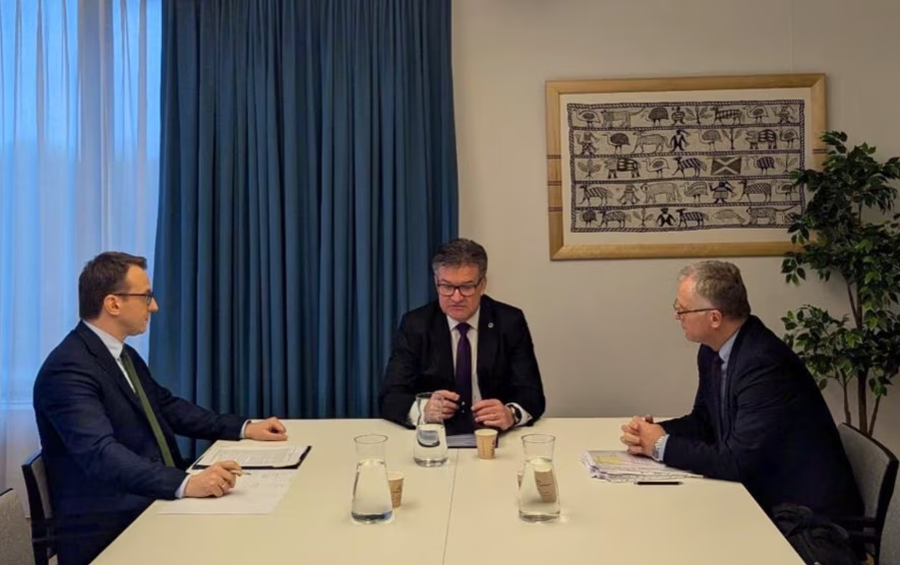
Officials from Kosovo and Serbia will make mutual visits to advance the process of normalizing relations, or to contribute to the dialogue mediated by the European Union for this purpose.
At least, that's what the Agreement on Official Visits, which Pristina and Belgrade reached in 2014, states.
But, despite this, the parties often prohibit visits to each other's officials, accusing them of not respecting procedures.
On March 26, Kosovo banned the visit of Serbian Minister of Health, Zlatibor Lloncar, while on March 20, Serbia banned the visit of Kosovo Minister of Culture, Youth and Sports, Hajrulla Çeku.
Kosovo's Ministry of Foreign Affairs explained its decision by saying that Pristina initially sent a request for a visit to Belgrade, to which it did not respond, and said that Kosovo's approach to official visits will remain based on reciprocity.
Serbia did not provide any explanation as to why Çeku's request was rejected, but Kosovo was accused of "directly undermining the normalization of relations."
Radio Free Europe asked the European Union to comment on the recent bans on visits by officials from Kosovo and Serbia, namely to assess the damage that such actions cause to the process aimed at normalizing relations.
As of the publication of this article, REL had not received a response, but the EU has previously stated that it expects all agreements reached to be respected, including those on official visits.
What does the Agreement say about official visits?
The 2014 Agreement on Official Visits states that the parties - through liaison officers - will inform each other about the visits of their first and second category officials.
The first category includes: the president, the prime minister, the deputy prime ministers, the speaker of the parliament, and the ministers of interior, foreign affairs, and defense.
The second category includes all other ministers, deputy speakers of the Assembly, directors of government offices and security agencies, presidents of the Constitutional and Supreme Courts, the public prosecutor, as well as all other persons who have physical security, such as religious leaders.
For visits by officials belonging to the first category, the request must be made at least 72 hours in advance, while for visits by officials of the second category, the other party must be notified at least 48 hours in advance.
The liaison officer is the one who mediates the process and confirms acceptance. If there is no response within a certain period, the visit is considered approved.
The agreement on official visits also provides that each party shall appoint an official who will have regular and simplified access to the other party and to whom the parties shall provide logistical information to facilitate the preparation of the visits.
Some of the unrealized visits
Several times a year, one side or the other informs the public that an official visit has not been approved.
Over the past year, the European Union reacted on several occasions to the ban on visits, calling on both Kosovo and Serbia to adhere to the agreements reached.
For example, in early 2024, official Belgrade banned Kosovo's Minister of Internal Affairs, Xhelal Sveçla, from visiting the Presevo Valley in southern Serbia, where the majority Albanian population lives.
The European Union subsequently announced that Minister Svečla's visit had been announced in accordance with the Agreement on Official Visits and called on Belgrade to allow it.
Then, in May 2024, Kosovo banned the visit of the director of the Office for Kosovo in the Government of Serbia, Petar Petkovic.
A few days later, the visit of the Serbian patriarch, Porfirije, was also banned, with the Kosovar authorities explaining that visits from Serbia would not be allowed, while official Belgrade continues to violate Brussels agreements and fail to stop its campaign against Kosovo on the international stage.
The EU reacted again, saying that by banning the Serbian patriarch's visit, Kosovo violated the agreement reached with Serbia within the framework of the dialogue.
But, in the meantime, the parties have also allowed several mutual visits by officials.
Thus, Albanians in Serbia were visited by Kosovo's Deputy Prime Minister, Besnik Bislimi, and Foreign Minister, Donika Gërvalla, while Serbian President, Aleksandar Vučić, and now former Serbian Prime Minister, Ana Brnabić, visited northern Kosovo.
The case of Marko Djuric
In March 2018, Kosovo Police detained the then director of the Office for Kosovo in the Government of Serbia, Marko Đurić, for entering without permission from the authorities.
He left Kosovo territory after giving a statement at the police station in Pristina.
During the arrest operation, sirens were heard in North Mitrovica, while the police had to use tear gas, injuring 32 people.
Kosovo authorities later announced that Djuric and the then Serbian Defense Minister, Aleksandar Vulin, were not allowed to enter, due to "incitement to hatred."
The European Union condemned the events in Kosovo and said such actions were "contrary to the normalization of relations."
Western countries, including the US, also expressed concern about the potential escalation of the situation.
High-level political dialogue between Kosovo and Serbia was blocked after an armed group of Serbs attacked the Kosovo Police in the village of Banjska, Zvecan, in September 2023, and killed a policeman.
This attack was preceded by high tensions, as Serbs in the northern part abandoned Kosovo institutions to oppose the Kosovo Government's decision to replace Serbian license plates with Kosovo ones.
Local Serbs erected barricades and protested, and boycotted local elections. This action later resulted in the appointment of Albanian mayors to the four Serb-majority municipalities.
The new EU envoy for the dialogue, Peter Sorensen, visited Pristina and Belgrade this month, where he said his priority is to secure a meeting between representatives of Kosovo and Serbia.
EU foreign policy chief Kaja Kallas stated in February that she had taken into account criticism of the current format of the Kosovo-Serbia dialogue and that she, together with Sorensen, would examine options to make it functional./ REL (A2 Televizion)











